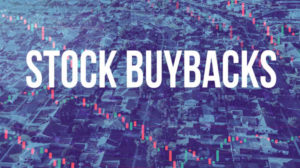
Stock buybacks have fallen short of expectations in 2022. At The Wall Street Journal, Spencer Jakab explains what happened, writing:
Washington hates stock buybacks as much as Wall Street loves them.
This was supposed to be not just a record year for American companies’ favorite way of rewarding shareholders but also one when a big, gaudy number—a middle finger of sorts to sanctimonious politicians—was supposed to be reached. Buybacks for companies in the S&P 500 were predicted by Goldman Sachs and others to cross the $1 trillion threshold.
After they got off to a raucous start, reaching $281 billion in the first quarter, congressional resolve stiffened and a long-threatened 1% tax on net buybacks, set to take effect in January, made it into the Inflation Reduction Act passed this summer. As with so many pieces of law, it looked like the measure would backfire, encouraging a jump in the very behavior it sought to curb. For a variety of reasons, though, this probably won’t be a $1 trillion year after all.
“If you had asked me a couple of months ago, I would have said you’d have a pretty good shot at that record,” says Howard Silverblatt, Senior Index Analyst at S&P Dow Jones Indices.
Buybacks lower share counts and boost per-share earnings. Since companies get more bang for their buyback buck when stock prices are lower, one might think that this year’s bear market would have further loosened corporate cash spigots, even without the urgency created by a tax deadline. But companies are awful market timers. Take Facebook META -1.25%decrease; red down pointing triangle parent Meta Platforms, one of the largest buyers of its own stock in recent years. In the 12 months through September, Meta bought back a whopping $48 billion of its own stock at an average of $304 a share. Its stock price is now just $111—and last week Meta announced it would lay off 11,000 employees to save money.
Though less extreme, corporate America as a whole has also gotten it wrong recently. After hitting a quarterly record just as stocks peaked, S&P 500 buybacks slumped by almost 22% in the second quarter compared with a year earlier as stocks plunged into a bear market. And, as of Wednesday, with some companies still due to report their results, Mr. Silverblatt estimates third-quarter buybacks were about 11% lower than a year earlier.
There is a tailwind for buybacks in the fourth quarter, now under way, but for a bad reason, he says. More employees with stock options are choosing to exercise them before they need to, perhaps because they are worried that their employers’ shares will fall even more. When companies see that their executives are exercising options then they often automatically boost their buybacks to soak up the newly created stock—a process called sterilization that doesn’t actually reduce their share count on a net basis.
Read more here.




